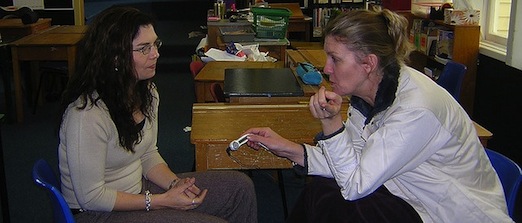Unlocking Your Potential with Appreciative Inquiry
 How many times have you heard about The Power of Positive Thinking? From childhood, reading books like The Little Engine That Could and hearing our parents and teachers say “If you think you can’t, you’re right,” we’re taught the benefits of optimism and pitfalls of pessimism. Yet when most companies want to expand and improve, they look for a problem. People are trained to use a deficiency model which asks questions like, “What are we doing wrong?” and “How can we fix it?” so they can improve upon their practices by providing solutions to those problems. Why is this? Why not apply everything we’ve been taught about optimism to our business practices? Appreciative inquiry does just that.
How many times have you heard about The Power of Positive Thinking? From childhood, reading books like The Little Engine That Could and hearing our parents and teachers say “If you think you can’t, you’re right,” we’re taught the benefits of optimism and pitfalls of pessimism. Yet when most companies want to expand and improve, they look for a problem. People are trained to use a deficiency model which asks questions like, “What are we doing wrong?” and “How can we fix it?” so they can improve upon their practices by providing solutions to those problems. Why is this? Why not apply everything we’ve been taught about optimism to our business practices? Appreciative inquiry does just that.
What Is Appreciative Inquiry?
Appreciative Inquiry (AI) takes the belief that there is something good in every person and in every company. Rather than looking at weaknesses, AI uses a strengths-based approach – identifying the best practices and applying them to other areas of the company. Furthermore, AI is all about asking “unconditional, positive questions” to discover and identify these strengths. And it does all of this through four stages, or, as it is generally known, the “4D Process.”
- Discovery – Find the best of what already exists by inquiring as to what’s working
- Dream – Formulate a purpose and a vision based in the company’s potential
- Design – Identify the characteristics of an ideal organization that can help to realize the organization’s new dream
- Destiny – Build hope and momentum around achieving the dream and design
Why Should I Use It?
In case study after case study, appreciative inquiry has proven its effectiveness. The Pueblo Santa Ana casino in Albuquerque, New Mexico was lacking in customer service, and decided to perform an AI on its table-games and slots departments. They asked all of their 820 employees how they could create an atmosphere of a hometown-casino, and then implemented their ideas in marketing and operations. The result? In just one fiscal year they had a profit turnaround of $10 million, and moved from fourth to third place in total market share in the region.
Avon Mexico was struggling with issues of sexual harassment. They hired a New York consulting company, but despite everything the consultants tried the problem only got worse. Finally they decided to try Appreciative Inquiry, performing about 300 interviews and collecting hundreds of employee stories. From these, about thirty visionary propositions were created. The propositions were implemented and, several years later, Avon Mexico received the 1997 Catalyst Award for best place in the country for women to work.
Nutrimental Foods of Brazil decided to close down the plant for a full day to bring all 700 employees together to discover what factors had been the biggest contributor to the company’s success. Then, over the next four days, a group of 150 stakeholders used the employee’s findings to map out what the ideal Nutrimental would look like in ten years. The stakeholders created three new business directions and the organization proceeded to implement their suggestions. Six months later Nutrimental was recording record bottom lines with figures in the millions of dollars and were seeing profits up 300% from before the AI.
Switching to Appreciative Inquiry may be a big decision, and the process itself could certainly be an adventure, but with proven benefits so great – what do you have to lose?
Jennifer Titche is EmployInsight’s community outreach specialist and is interested in the people part of business and human resources. She believes in making personal connections whenever possible, doing what you love, and never settling for anything but the best.
1Eaton, S.E. (2010). Appreciative Inquiry: An overview. Eaton International Consulting Inc. Retrieved from www.eatonintl.com
2Kinni, T. (2003, September 22). The Art of Appreciative Inquiry. In Harvard Business School’s Working Knowledge for Business Leaders. Retrieved March 19, 2012
3Cooperrider, D. L., & Whitney, D. A Positive Revolution in Change: Appreciative Inquir. . Retrieved March 19, 2012
Photo Credit: flickr/beedieu
